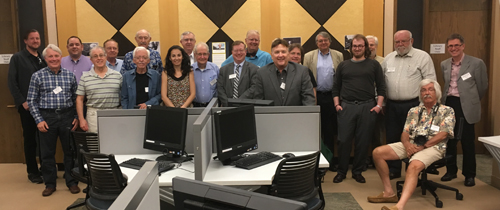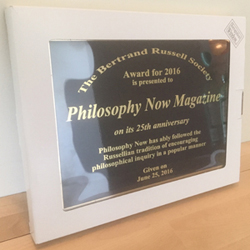
Your complimentary articles
You’ve read one of your four complimentary articles for this month.
You can read four articles free per month. To have complete access to the thousands of philosophy articles on this site, please
Conference
Russell Revels Rock Rochester
Why do so many academics travel hundreds or thousands of miles to conferences instead of spending their summers fishing or playing Pokémon Go? Let’s find out!
Among the many academic philosophy organisations to hold an annual conference one of the best is the Bertrand Russell Society (BRS). Born in 1872, the grandson of a British prime minister, Bertrand Russell became one of the twentieth century’s leading logicians. He tried to discover a firm foundation for mathematics in set theory. After his friend G.E. Moore convinced him of the shortcomings of Hegelian idealism, he co-invented analytic philosophy and so led a revolution in philosophy in the English-speaking world. He was the friend and teacher of Ludwig Wittgenstein. And for the second half of his long life he was a social philosopher, social activist and pacifist.

The Bertrand Russell Society, which was formed in 1974 to study Russell’s ideas, holds an annual conference in a different university each year. This year’s was held in the pleasant and airy surroundings of St John Fisher College, in Rochester, New York’s third largest city, just across Lake Ontario from Toronto.
The core of the conference consisted of around twenty talks given by scholars about different aspects of Russell’s life and ideas. The papers broadly divided into two groups: those relating to Russell’s social philosophy, ethics, views on education and activism for peace, and those related to his investigations in theory of knowledge and philosophy of mathematics.
The former group included papers on such diverse topics as: Russell’s response to the Cuban missile crisis; the consequences of his views on appeasement; whether Russell’s approach to education was what is now called child-centred (he and his wife Dora ran a school in the 1920s); Russell’s ideas in his 1930 book The Conquest of Happiness; and Russell’s lifelong interest in China; including his travels there in 1920-21.
Some of the latter papers tended to be a little more technical in nature, particularly Landon Elkin’s fascinating ‘A Theory of Infinity for Principia Mathematica’. Others included Russell Wahl’s talk about Wittgenstein and Russell’s discussions about the nature of matter, and David White on the many ways in which Russell’s approach to logic differed from that of the famous American pragmatist John Dewey.
Red Hackle Hour
All societies have their cherished rituals, and the BRS has Red Hackle Hour. Apparently Russell’s favourite brand of whisky was called Red Hackle, and the BRS Conference in remembrance of this fact has always included a pre-dinner social session at which actual Red Hackle was imbibed. Sadly a few years ago the brand was retired by the distillers (it apparently had too few fans apart from Russell himself) so the Society has been reduced to decanting a different whisky into a genuine Red Hackle bottle for the sake of maintaining this tradition. The whisky has changed but the spirit lives on. This year Red Hackle Hour was further enlivened by the launch of a new book, Bertrand Russell, Public Intellectual, edited by Timothy J. Madigan and Peter Stone.
Once the whisky and a good dinner had sufficiently mellowed the assembled philosophers, proceedings moved on to awards including the Bertrand Russell Society’s Annual Award, this year kindly given to Philosophy Now for “encouraging philosophical enquiry in a popular manner.” The Russellians smiled benevolently as the award was accepted on behalf of this magazine by editor Rick Lewis, and indulgently tolerated his attempts at humour before helping him from the stage.

So why go to such a conference? Firstly because it is fun and you can have some great conversations with some fascinating people (random example: Kenneth Blackwell, who as a young graduate student actually worked with Russell to sort and collate his papers). Secondly because, on the evidence of papers at this gathering, the discussion of a historical philosopher can provide inspiration for serious original philosophical work in a whole range of areas. In fact, future BRS conferences will apparently feature a slot especially for papers by graduate students, which could be great for new philosophers looking for the ‘present at a conference’ experience. And of course, there is ‘Red Hackle’ too!
• You can find out more about the Bertrand Russell Society at http://bertrandrussell.org









